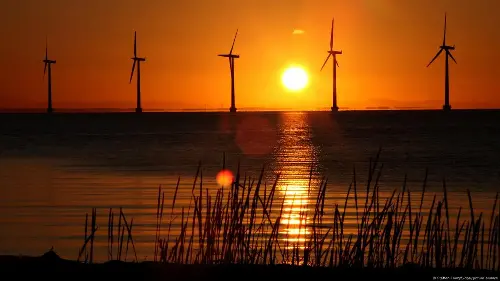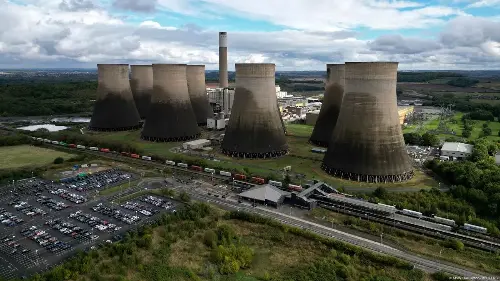
Renewable energies are expanding rapidly in high-emissions countries, but too many states are prolonging the use of fossil fuels, particularly gas, according to the latest Climate Change Performance Index, which ranks states' climate protection measures.
"The world is at a turning point. Peak of global emissions is closely in sight," said Niklas Höhne of German climate policy think tank NewClimate Institute, and a co-author of the report. But states need to act quickly to drastically cut emissions and "prevent further dangerous consequences of climate change," he added.
The CCPI, published annually, evaluated the 63 countries plus the European Union that are responsible for 90% of global greenhouse gas emissions.
Of the countries analyzed, 61 have managed to increase the share of green energy sources, like wind and solar, in their energy mixes over the last five years.
"Renewables are in the fast lane, especially in the electricity sector," said lead author Jan Burck from environment NGO Germanwatch, on the launch of the CCPI during the UN climate summit in Azerbaijan. "In addition, there is an increasing electrification of the mobility, residential and industrial sectors. The trend toward electrification is continuing."
Still, 42 countries' current per capita emissions are not aligned with the Paris goal of limiting global average temperature rise to 1.5 degrees Celsius (2.7 Fahrenheit).
The CCPI, said Höhne, shows "how big the resistance from the fossil fuel lobby is."
In the US presidential election, this was "a decisive factor in bringing [Donald] Trump back to the White House," said Höhne. The US has experienced a boom in shale gas over the past few years and Trump has promised to further expand domestic fossil fuel production and spend less on clean energy.
The countries that ranked worst in the CCPI — Iran, Saudi Arabia, the United Arab Emirates and Russia — are also among the largest oil and gas producers in the world. The share of renewables in their respective energy mixes is under 3%, the analysis found, with the countries showing "no signs of departing from fossil fuels as a business model."
Morocco, India, Philippines rank highly in climate protection
The CCPI, put together by experts from Germanwatch, NewClimate Institute and international environment grouping Climate Action Network, ranks countries' progress in cutting carbon dioxide (CO2) emissions and energy use as well as expanding renewables and improving climate policy.
The top three spots in the ranking remained unclaimed — as is usually the case — because none of the countries surveyed are doing enough to "avoid dangerous climate change" and achieve a "very high" rating.
Denmark once again clinched the number 4 spot, followed by the Netherlands and the United Kingdom, one of the countries with the biggest ranking improvement this year.
The UK moved up 14 positions from 2023 due the recent closure of the country's last coal power plant. The new Labour government has also pledged not to issue any new licenses for fossil fuel projects, making the country a pioneer among industrialized G7 nations.
The CCPI also gave Norway, Sweden, Luxembourg, Estonia and Portugal a "high" rating, alongside the Philippines, Morocco, Chile and the world's most populous country, India.
Middling results for the EU, Germany, Egypt and Brazil
The European Union slipped one spot down the ranking to 17th place and scored a "medium" rating for its overall climate performance.
While the authors described the bloc's climate protection — based on the EU Green Deal— as major progress, they said measures it had taken so far didn't amount to a fair share of global greenhouse gas emissions cuts. The authors called on the bloc to stop financing fossil fuels and fulfill pledges to phase out oil and gas subsidies by 2025.
Germany, the EU's largest economy, also slipped two places to 16th and was given a "medium" rating. "Although considerable progress has been made in renewables, the political inaction in the transport and building sectors still leads to high emissions," said co-author Thea Uhlich from Germanwatch.

Both sectors have consistently missed their emissions reductions targets, and German environmental NGO BUND has said it is taking legal action over the country's main climate legislation, calling it insufficient.
The authors gave nine other EU countries, as well as Egypt, Nigeria, Brazil, Colombia, Vietnam, Thailand and Pakistan, a "medium" rating.
Have China, US reached peak CO2 emissions?
China and the US are the world's biggest polluters of greenhouse gas CO2 and were rated "very low" for climate performance.
In the US, the landmark Inflation Reduction Act, a climate bill signed by outgoing President Joe Biden, has been positive for expanding renewables, said the authors. But "per capita emissions are still very high at 15.8 tons of CO2 equivalent per year," added Höhne.
Some fear a Trump presidency will set back climate action, and while Trump's election is "certainly not good news" for the climate, said Höhne, "it remains to be seen" how much legislation the new administration can roll back.
"Even Trump can't stop the boom in renewable energy," he said.
As for China, the nation is experiencing an "unprecedented" renewables boom, pointed out Burck from Germanwatch.
"Emissions appear to have almost peaked. That would be a real milestone and an important driver worldwide," he said. In the first quarter of 2024, CO2 emissions fell in China without an accompanying economic downturn. This is significant as emissions otherwise usually fall when a country is in recession.
"But to reduce the country's immense emissions quickly and sustainably, we now need a clear move away from fossil fuels," Burck said.
There is currently no indication the country is moving in that direction; China is still building a lot of coal plants. But things could change with the pending new five-year plan.
"This is a huge opportunity for China to gain international recognition — especially in contrast to the future US government," he said.
This article was originally written in German.